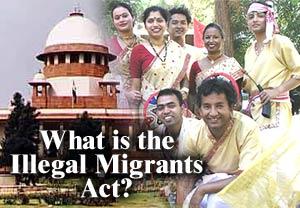Home > News > Report
G Vinayak in Guwahati |
July 12, 2005 20:35 IST

The Supreme Court on Tuesday struck down the Illegal Migrants (determination by tribunals) Act, 1983.
Rediff.com presents you a primer on what the act means, why it was brought in, and what the Supreme Court order will mean.
What is the IMDT Act, 1983?
On October 15, 1983, the Government of India passed an Ordinance to set up tribunals 'for determination of the question whether a person is or is not an illegal migrant.'
On December 12, 1983, IMDT Act was introduced and passed in Parliament.
Where is the act applicable?
Only in the state of Assam. In other states, detection of foreigners is done under the Foreigners Act, 1946.
Ironically, there was no member in the Lok Sabha from Assam's Brahmaputra Valley when the act was passed, since elections could not be held in the state in 1980.
What is the difference between the IMDT Act and Foreigners Act?
Under the IMDT Act, the onus of proving one's nationality or otherwise lies on the complainant whereas under the Foreigners Act, the onus is on the accused.
What did the act set out to do?
According to this act an illegal migrant is a person who:
(i) entered India on or after March 25, 1971.
(ii) was a foreigner
(iii) entered India without being in possession of a valid passport or other travel documents or any other legal authority.
Clauses 4 and 9 of the IMDT Act said those who came before March 25, 1971 would not come under the purview of the act as the issue of such cases 'has been left for negotiations.'
But even in the case of post-1971 migrants the procedures were deliberately kept cumbersome. For instance, the Act provided for two individuals living within a radius of 3 km of a suspected illegal migrant to approach an IMDT Tribunal, deposit a sum Rs 25 and then file a complaint. (The three km restriction was subsequently modified and now the complainant could be from the same police station limits as the accused, while the deposit sum was reduced to Rs 10).
But the most contentious provision of the act was the condition that the onus of proving the citizenship credentials of a person in question lies with the complainant and the police, not on the accused. Under the Foreigners Act prevailing in the rest of the country, the onus is understandably on the accused. To cap it all, the act also provided that 'if the application is found frivolous or vexatious' the Central Government may not accept it.
In short, the country had two anti-immigration acts. By scrapping the IMDT Act, the Supreme Court has removed the anomaly.
Chronology of the act's journey towards repeal.
1992: Asom Gana Parishad's Mangaldoi convention resolves to demand repeal of IMDT Act.
Sept 19, 1992: Pachu Gopal Baruah and others challenge validity of IMDT Act in the Guwahati high court.
1998: Tripartite discussion between AASU, Government of Assam and Government of India results in a consensus on repeal of IMDT Act 'in the greater interest of the people of Assam.'
1998: All India Lawyers Forum for Civil Liberties files petition in Supreme Court for repeal of IMDT Act.
Sept 1, 1999: Government of Assam files affidavit for the first time in Supreme Court supporting repeal of IMDT Act.
March 8, 2000: ID Swamy, Union Minister of State for Home tells Parliament: 'Government is of the view that the IMDT Act in its application in the state of Assam alone is discriminatory. A proposal to repeal the act is under consideration of the government.'
April 2000: Sarbananda Sonowal, president of AASU challenges the validity of IMDT Act in Supreme Court.
Sept 2000: Law Commission's 175th report recommends repeal of IMDT Act.
June 2001: Assam government withdraws and changes affidavit in Supreme Court after Congress comes to power. Says the act should stay.
May 6, 2003: Union cabinet under Vajpayee decides to introduce Bill to repeal IMDT Act.
May 9, 2003: Government introduces Bill to repeal of IMDT Act in Parliament.
August 2003: The repeal Bill is referred to the Select Committee Parliament.
August to December 2003: Discussions in the select committee go on. Parliament dissolved. Repeal Bill falls through.
July 12, 2005: Supreme Court strikes down the act.